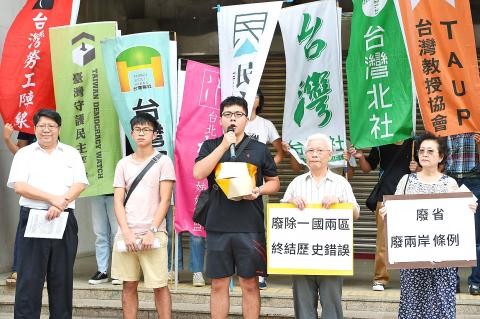The Legislative Yuan should initiate the final steps to abolish the Taiwan Provincial Government to follow up on a planned elimination of the Mongolian and Tibetan Affairs Commission, protesters said yesterday.
About a dozen members affiliated with the Economic Democracy Union and several other groups protested outside a Legislative Yuan side gate to demand that the Provincial Government’s budget be eliminated during the upcoming legislative session, followed by formal legal amendments to legislate it out of existence next year.
They also called for the Democratic Progressive Party (DPP) to make abolishing the Act Governing Relations Between the People of the Taiwan Area and the Mainland Area (臺灣地區與大陸地區人民關係條例) a platform plank during the next round of legislative elections.

Photo: Liao Chen-huei, Taipei Times
“We hope to make the sovereign power of Taiwanese collide with our Republic of China Constitution,” union spokesman Chien Nien-yu (簡年佑) said. “Legal changes by the Legislative Yuan can challenge inappropriate constitutional restrictions and create new energy for a new constitution or sweeping reform.”
The Republic of China Constitution was adopted by the Chinese Nationalist Party (KMT) government in Nanjing in 1947, with amendments restricting its application to the nation’s “free area” following the KMT’s defeat in the Chinese Civil War.
The Constitution mandates the existence of a provincial government while allowing for legislation to define its specific function and organization.
In practice, the provincial government has been “frozen” and largely non-functional since 1998, when it was drastically downsized.
Protesters yesterday compared it to an “appendix.”
“Even though the provincial government has been frozen for almost 20 years, it still employees more than 100 people across several different bodies, while wasting NT$240 million [US$7.98 million] in taxpayer dollars last year,” said union secretary-general Chen Kuan-yu (陳冠宇), who also announced plans to burn a pile of paper “gold ingots” at a vigil at Liberty Square on Monday night.
Protesters said the vigil date was selected because it corresponded with the 25th anniversary of the promulgation of the Act Governing Relations between the People of the Taiwan Area and the Mainland Area.
“It would not be enough just to amend the act to change references to ‘mainland area’ to ‘China’ and references to the ‘Taiwan area’ to ‘our country,’” Lai Chung-chiang (賴中強) said, calling for restrictions on executive power to regulate Chinese trade and investment.
“The key characteristic of the act is numerous blank checks allowing the executive branch to do as it pleases on a variety of issues where they should be governed by specific laws,” Lai said.
The law should be replaced with a China Relations Act in the medium term to allow transition for articles governing behavior of Chinese citizens to be written into individual legislative acts to mirror passages “for foreigners.”
“Right now, Chinese are legally considered special nationals of the Republic of China, but we want to change that to their being considered special foreigners,” he said, adding that his group does not advocate using a referendum to abolish the act.
Referendums have “more important uses,” he said.

Taiwan is to commence mass production of the Tien Kung (天弓, “Sky Bow”) III, IV and V missiles by the second quarter of this year if the legislature approves the government’s NT$1.25 trillion (US$39.78 billion) special defense budget, an official said yesterday. Commenting on condition of anonymity, a defense official with knowledge of the matter said that the advanced systems are expected to provide crucial capabilities against ballistic and cruise missiles for the proposed “T-Dome,” an advanced, multi-layered air defense network. The Tien Kung III is an air defense missile with a maximum interception altitude of 35km. The Tien Kung IV and V

The disruption of 941 flights in and out of Taiwan due to China’s large-scale military exercises was no accident, but rather the result of a “quasi-blockade” used to simulate creating the air and sea routes needed for an amphibious landing, a military expert said. The disruptions occurred on Tuesday and lasted about 10 hours as China conducted live-fire drills in the Taiwan Strait. The Civil Aviation Administration (CAA) said the exercises affected 857 international flights and 84 domestic flights, affecting more than 100,000 travelers. Su Tzu-yun (蘇紫雲), a research fellow at the government-sponsored Institute for National Defense and Security Research, said the air

A strong continental cold air mass is to bring pollutants to Taiwan from tomorrow, the Ministry of Environment said today, as it issued an “orange” air quality alert for most of the country. All of Taiwan except for Hualien and Taitung counties is to be under an “orange” air quality alert tomorrow, indicating air quality that is unhealthy for sensitive groups. In China, areas from Shandong to Shanghai have been enveloped in haze since Saturday, the ministry said in a news release. Yesterday, hourly concentrations of PM2.5 in these areas ranged from 65 to 160 micrograms per cubic meter (mg/m³), and pollutants were

Taiwan’s armed forces have established response protocols for a wide range of sudden contingencies, including the “Wan Chun Plan” to protect the head of state, the Ministry of Defense (MND) said today. After US President Donald Trump on Saturday launched a series of airstrikes in Venezuela and kidnapped Venezuelan President Nicolas Maduro, concerns have been raised as to whether China would launch a similar “decapitation strike” on Taiwan. The armed forces regularly coordinate with relevant agencies and practice drills to ensure preparedness for a wide range of scenarios, Vice Minister of National Defense Hsu Szu-chien (徐斯儉) told reporters before a